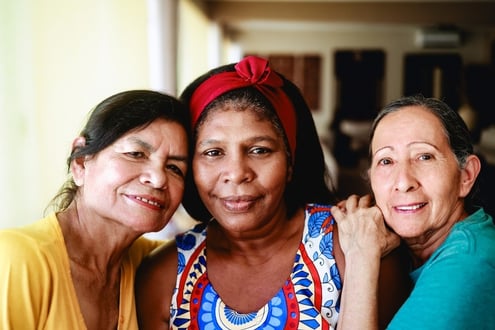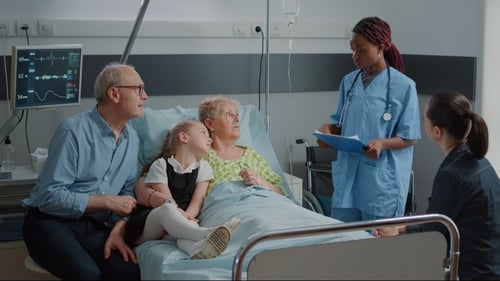Targeted Therapy Side Effects
Side Effects
Like any medication, targeted therapies may cause side effects. Although some effects are more common with certain medications, each person's experience may be different. Side effects may vary depending on your general health, the type of agent and dose you are on, other medications you take, the site of your cancer and other factors.
It's important to talk with your doctor about possible treatment side effects and options for minimizing them. Some of these effects may improve with medication or other medical interventions. Report all symptoms or changes in your health to your doctor. You may also report any suspected side effects directly to the online or by calling: 1-800-FDA-1088.
What side effects may be seen with targeted therapies?
Below are some of the more common or serious side effects seen with targeted therapies. Continue reading for more details and ways to manage each of the side effects listed.
Table of common and serious side effects of different types of targeted therapies
The table below lists some of the more common or more serious side effects of different classes of targeted therapies. Importantly, side effects vary between drugs, even those in the same category. Talk to your doctor about which side effects are most likely, which ones are most serious, symptoms to watch out for and who to contact with concerns.
|
Type of Agent |
Name of Agents |
Common Side Effects |
Serious Side Effects |
|
AKT inhibitor |
Truqap |
|
|
|
Anti-Her2 kinase inhibitor |
Tukysa (tucatinib) |
|
|
|
Anti-HER2 antibody |
|
|
|
|
BRAF and MEK inhibitors |
|
|
|
|
CDK 4/6 inhibitors |
|
|
|
|
Anti-EGFR antibody |
Erbitux (cetuximab) |
|
|
|
Anti-EGFR antibody |
Vectibix (panitumumab) |
Used alone:
When combined with chemotherapy:
|
|
|
Antibody-drug conjugate |
Datroway (datopotamab deruxtecan-dlnk) |
|
|
|
Antibody-drug conjugate |
Trodelvy (sacituzumab govitecan-hziy) |
|
|
|
Anti-VEGF or VEGF receptor antibody |
|
|
|
|
MTOR inhibitor |
Afinitor (everolimus) |
|
|
|
Multi-target kinase inhibitor |
|
|
|
|
PARP inhibitors |
|
|
|
|
PIK3 inhibitor |
Piqray (alpelisib) |
|
|
Allergic reactions
Any therapy can cause an allergic reaction in someone who is sensitive to the medication. Allergic reactions may range from mild to severe. Rarely these reactions can be fatal. Your oncologist may prescribe medication to decrease your risk for severe allergic reactions caused by targeted therapies.
Anemia, bleeding and low white blood cell counts
Some targeted therapies damage bone marrow, where blood cells are made. This can result in too few red blood cells (anemia), too few platelets (thrombocytopenia) and a low white blood cell count (neutropenia).These bone marrow effects can lead to symptoms like fatigue, rapid heart rate, bleeding and increased risk for infection. Most of the time, these changes are mild. Your oncologist may test your blood, to make sure that your blood counts do not drop too low, which could delay treatment.
Fatigue
Fatigue may be caused by cancer or treatments, including targeted therapies. You should report fatigue to you doctors so they can check and treat you for underlying causes, including depression, sleep disturbances and medication side effects. You may be able to improve your energy level with these suggestions:
- making sure that your diet is balanced and provides you with adequate nutrition. Ask your doctor for a referral to a nutritionist if you need help figuring out your nutritional needs.
- making sure that you get adequate sleep.
- trying to stay physically active, which can help improve your energy level.
Heart damage
Certain targeted therapies—especially anti-Her2 therapies—can cause heart damage. Your oncologist may run tests to make sure that your heart function is normal before, during and after treatment. Some drugs may help protect the heart from damage caused by targeted. Heart damage caused by treatment can also be minimized by lowering the dose, changing how it is given or switching to different drug.
Mouth and tongue sores
Some targeted therapies can cause painful sores of the mouth and lips (called stomatitis), which can make eating painful. Certain medications and mouthwashes can help to repair mouth cells, coat the sores or block the pain caused by the sores. Rinsing your mouth with salt or baking soda can also improve mouth sores.
Nausea, vomiting and appetite changes
Several different medications help to reduce nausea during treatment. This can improve appetite, reduce weight loss and support a balanced diet—referral to a nutritionist can help assure that you maintain a balanced diet during treatment. Certain foods may be more or less likely to trigger nausea, vomiting or upset stomach.
In the News
Study : Use of cannabis for cancer symptom management
Among people with cancer, interest in the use of cannabis...
Study : Managing the side effects of advanced endometrial cancer treatment
Immunotherapy plus targeted therapy is a treatment option for advanced...
Topic : Acupressure for cancer symptom relief
Acupressure is a safe treatment that can be used to...
Topic : Experts call for early palliative care for cancer patients
People with cancer need support and care not only at...
Study : Physical activity may decrease fatigue associated with cancer treatment
Many cancer survivors experience fatigue during and after they complete...
Study : The hidden financial burden of treating cancer care symptoms
Drugs commonly used to treat symptoms of cancer and cancer...







